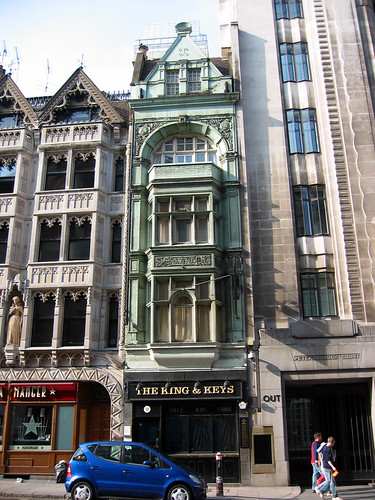
{Photos by rocketlass.}
One of the most interesting aspects of The Pickwick Papers, for a reader who comes to it with the whole of Dickens before him, is the bits of later Dickens that we see in this, his earliest extended production. An interpolated tale of a heartless sexton, for example, is a first assay of the idea that would blossom into A Christmas Carol, while Mr. Pickwick's sojourn in the Fleet Prison offers the first real hint that Dickens's agenda might extend beyond entertainment.
But what I find most fascinating is how attuned Dickens already is to the reality of the city--and how its bustle and excitement are markers of its most salient characteristic, constant change.

Here, in the opening of Chapter 10, he reflects on the losses necessarily entailed by that change:
There are in London several old inns, once the head quarters of celebrated coaches in the days when coaches performed their journeys in a graver and more solemn manner than they do in these times; but which have now degenerated into little more than the abiding and booking places of country wagons. The reader would look in vain for any of these ancient hostelries, among the Golden Crosses and Bulls and Mouths, which rear their stately fronts in the improved streets of London. If he would light upon any of these old places, he must direct his steps to the obscurer quarters of the town; and there in some scluded nooks he will find several, still standing with a kind of gloomy sturdiness, amidst the modern innovations which surround them.The nostalgia seems awfully rich for a twenty-four-year-old, who could not have known the coaching inns for long (though now that I think about it, I suppose I tended more towards unearned nostalgia at that age than Ido these days--I hope!).
As Robert Alter notes in Imagined Cities: Urban Experience and the Language of the Novel (2005), from which the title of this post is taken, Dickens
was, as many testimonies by his contemporaries suggest, a passionate Londoner. All his life, he loved exploring London's nooks and crannies, usually on foot, undeterred by the filth and stench and threat of disease of its slums, and he could amaze his friends with his minute knowledge of its most obscure neighborhoods and byways.But what lover of the secret and obscure areas of a city, no matter how much he understands that their prized obscurity is a result of their obsolescence, doesn't at the same time risk falling victim to nostalgia, hating the change whose earlier expression resulted in the very places whose eventual loss he stands ready to deplore?

For even as Dickens grasped, as well as any other novelist before or since, the incredible generative powers of the city--the possibilities of serendipity, boundary-crossing, and surprise among them--he railed against its disruptions and destructions. Pickwick is a novel of coaches and relative quiet, even in its London scenes; by the time of Dombey and Son, we are in the railroad era, when whole neighborhoods are being destroyed, and whole ways of life with them. I don't really mean to find fault with Dickens here--the coming of the railroads does seem to have been truly horrible, whatever its overall benefits. It's more that I'm surprised at his awareness already, at such a young age, that he is in the midst of perpetual change, and that one of his duties as a novelist will be to take note and preserve. At his best, his response to that is righteous anger; at his worst, it's cloying sentiment.
The ultimate recourse for Dickens, time and again, was to family, and to small groups bound, not by ties of commerce or tradition--for those were perpetually liable to external breakage--but by friendship, loyalty, and love. As Franco Moretti explains in his Atlas of the European Novel, 1800-1900 (1998),
It is a further instance of the tentative, contradictory path followed by urban novels: as London's random and unrelated enclaves increase the "noise," the dissonance, the complexity of the plot--the family romance tries to reduce it, turning London into a coherent whole.It is in the teeming drama of the city that the individual can find his destiny, but it is by the fireside, surrounded by loved ones, that he can find his home. In that, too, Dickens was prescient: what is the Pickwick Club if not a forerunner of the much-discussed "urban tribes" formed by relative newcomers to the contemporary city who, lacking either the obligations or the guidance of family or tradition, render the vastness of the city manageable by reimagining it as a small network of trusted friends?

Thank you for your postings on Dickens which I have enjoyed reading. Your adventures with Dickens remind me of my own quirk when reading his work (and others like his that are so bound up in specific locales): Though I cannot wander the streets looking for the settings, I succumb to my weakness for maps, and I seek out as many locales as I can as I go about my two-dimensional, vicarious wanderings. With novel in one hand and an atlas in another hand, I slow down and savor (albeit imaginatively) the settings. Were I living in London and reading Dickens, it would take me forever to finish any of the books because I would be constantly traveling from one place to another.
ReplyDelete